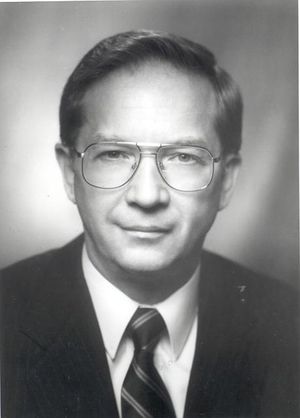Emerson Pugh: Difference between revisions
(→Emerson Pugh: added birth date) |
No edit summary |
||
| (9 intermediate revisions by 3 users not shown) | |||
| Line 1: | Line 1: | ||
{{Biography | |||
|Image=Emerson Pugh 2078.jpg | |||
|Birthdate=1929/05/01 | |||
|Associated organizations=IBM | |||
|Fields of study=Computing | |||
|Abstract=worked for IBM for twenty-five years in the following positions: research scientist, product development manager, and corporate executive. | |||
|Organization=IEEE | |||
|StartYear=1989 | |||
|Display name=Emerson W. Pugh | |||
}} | |||
Dr. Emerson Pugh is the author or co-author of a college physics text and several books on the history of IBM and the information processing industry. After receiving his Ph.D. in physics from the Carnegie Institute of Technology in 1956, Dr. Pugh worked for IBM for 35 years in a variety of capacities, including research scientist, product development manager, and corporate executive. | Dr. Emerson Pugh is the author or co-author of a college physics text and several books on the history of IBM and the information processing industry. After receiving his Ph.D. in physics from the Carnegie Institute of Technology in 1956, Dr. Pugh worked for IBM for 35 years in a variety of capacities, including research scientist, product development manager, and corporate executive. | ||
Dr. Pugh is a [[IEEE Fellow Grade History|Fellow]] of the IEEE, the American Physical Society, and the American Association for the Advancement of Science. He was [[Presidents of the Institute of Electrical and Electronics Engineers (IEEE)|IEEE | Dr. Pugh is a [[IEEE Fellow Grade History|Fellow]] of the IEEE, the American Physical Society, and the American Association for the Advancement of Science. He was [[Presidents of the Institute of Electrical and Electronics Engineers (IEEE)|IEEE President]] in 1989, and president of the IEEE Foundation from 2000 to 2004. | ||
Emerson | Emerson served on the IEEE History Committee, and in 2009, he created the [[Special:STARS|STARS program]] with the IEEE History Center, an online compendium of invited, peer-reviewed articles on the history of major developments in electrical and computer science and technology. | ||
== Further Reading == | == Further Reading == | ||
| Line 15: | Line 19: | ||
[[Oral-History:Emerson W. Pugh|Emerson's Pugh's Oral History]] | [[Oral-History:Emerson W. Pugh|Emerson's Pugh's Oral History]] | ||
[[ | [[First-Hand:Polio and Education|Polio and Education]], an account of Pugh's early life | ||
{{DEFAULTSORT:Pugh}} | |||
[[Category:Computing_and_electronics]] | |||
Latest revision as of 16:42, 20 May 2020
Emerson W. Pugh, IEEE President, 1989, worked for IBM for twenty-five years in the following positions: research scientist, product development manager, and corporate executive.
Biography
Dr. Emerson Pugh is the author or co-author of a college physics text and several books on the history of IBM and the information processing industry. After receiving his Ph.D. in physics from the Carnegie Institute of Technology in 1956, Dr. Pugh worked for IBM for 35 years in a variety of capacities, including research scientist, product development manager, and corporate executive.
Dr. Pugh is a Fellow of the IEEE, the American Physical Society, and the American Association for the Advancement of Science. He was IEEE President in 1989, and president of the IEEE Foundation from 2000 to 2004.
Emerson served on the IEEE History Committee, and in 2009, he created the STARS program with the IEEE History Center, an online compendium of invited, peer-reviewed articles on the history of major developments in electrical and computer science and technology.
Further Reading
Polio and Education, an account of Pugh's early life
